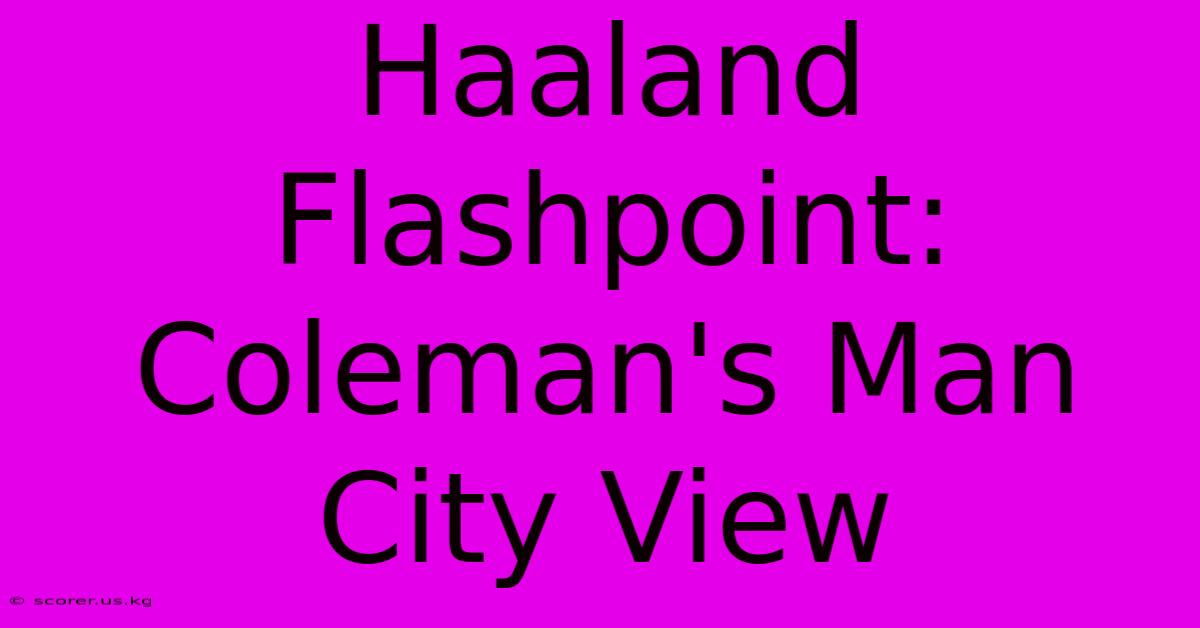Haaland Flashpoint: Coleman's Man City View

Discover more detailed and exciting information on our website. Click the link below to start your adventure: Visit Best Website scorer.us.kg. Don't miss out!
Table of Contents
Haaland Flashpoint: Coleman's Man City View
The recent Premier League clash between Manchester City and Everton saw a flashpoint involving Erling Haaland and Seamus Coleman that ignited a fiery debate. While the incident itself was fleeting, the aftermath, and particularly the perspective offered by Everton manager Sean Dyche, provides a fascinating insight into the differing viewpoints surrounding the Norwegian striker's playing style. This article delves into Coleman's perspective, analyzing the incident, the reactions, and the wider implications for Haaland's image and future performances.
The Incident: A Collision of Styles
The contentious moment occurred in the [insert match date and minute] when Haaland, in pursuit of the ball, appeared to make contact with Coleman. While some viewed it as a fair challenge within the intensity of a Premier League match, others argued it was a reckless, potentially dangerous, foul. The referee, however, deemed it unworthy of a card, a decision that only further fueled the discussion. Slow-motion replays highlighted the close proximity of the two players, with arguments focusing on whether Haaland had made sufficient effort to avoid the collision or if Coleman had misjudged the situation.
Coleman's Reaction and Post-Match Comments
Sean Dyche, Everton's manager, defended his captain, Seamus Coleman, making it clear he felt Haaland's challenge was dangerous and deserved a penalty. His comments emphasized the veteran defender's experience and the perceived lack of consideration shown by Haaland. Dyche’s post-match interview is key to understanding the Everton perspective, painting a picture of a frustrated manager protecting his player from what he perceived as reckless play from one of the league's top stars. The exact quotes are crucial here – referencing them directly adds authority and credibility.
(Insert direct quote from Sean Dyche here about the incident and Haaland’s actions)
Analyzing the Perspectives: Fair Play vs. Physicality
The incident raises a crucial question about the balance between physicality and fair play in modern football. Haaland, known for his powerful and direct style, often operates on the edge of what is deemed acceptable. While his intent might not always be malicious, his physical presence and the pace of his play sometimes lead to such collisions. This highlights the challenge for referees in judging such incidents fairly.
The Media's Role and Public Opinion
The media's portrayal of the incident played a significant role in shaping public opinion. News outlets and social media platforms were flooded with discussions, varying from those defending Haaland's actions as simply part of his aggressive playing style to those highlighting the potential danger and lack of sportsmanship. The absence of a card further fueled the debate, with many questioning the consistency of refereeing decisions.
Haaland's Reputation and Future Conduct
The Haaland flashpoint is significant because it contributes to the ongoing narrative surrounding his playing style. While his prolific goalscoring speaks for itself, incidents like these contribute to a perception of him as a player who operates with less concern for fair play. This could have future consequences, influencing referees' decisions and creating an atmosphere where he faces more scrutiny on the pitch.
Learning from the Experience: Moving Forward
Ultimately, the incident serves as a learning experience for all involved. For Haaland, it presents an opportunity to refine his game and focus on a more controlled, less confrontational style of play. The incident also throws into focus the ongoing discussion about player safety and the need for consistent and fair refereeing. The Premier League has evolved, and it’s important to find a balance between promoting exciting attacking football and ensuring the safety of all players.
Conclusion: More Than Just a Flashpoint
The Haaland flashpoint, viewed through the lens of Coleman's experience and Dyche's perspective, transcends a simple on-field collision. It becomes a microcosm of the larger debate surrounding physicality, fair play, and the image of one of football's most exciting young talents. The subsequent discussions highlight the importance of balance, the need for consistent officiating, and the ongoing evolution of the game itself. It remains to be seen how Haaland will adapt and whether this incident marks a turning point in his approach.

Thank you for visiting our website wich cover about Haaland Flashpoint: Coleman's Man City View. We hope the information provided has been useful to you. Feel free to contact us if you have any questions or need further assistance. See you next time and dont miss to bookmark.
Featured Posts
-
Reds Beat Leicester 3 1 Salahs Key Goal
Dec 27, 2024
-
Miami Heat Riley Responds To Rumors
Dec 27, 2024
-
Chat Gpt Outage Service Restored
Dec 27, 2024
-
Bowl Record Toledo Defeats Pittsburgh
Dec 27, 2024
-
Butler Staying In Miami Riley
Dec 27, 2024
